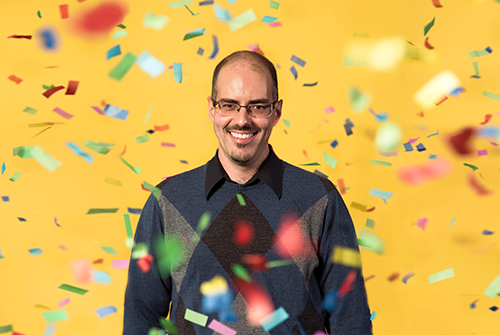The Resolution Habit
If you think keeping a resolution is all about willpower, think again.

Around this time every year, surveys tout the fact that 80 percent of Americans will have broken their New Year’s resolutions by February. But according to a Texas A&M University cognitive neuroscientist, the fault of this failure doesn’t lie solely in a lack of willpower, but rather in a lack of understanding of how the brain processes—and changes—habitual behavior.
Brian Anderson, assistant professor in the Department of Psychological and Brain Sciences in the College of Liberal Arts, explained that when you make a New Year’s resolution vowing to add a good habit to your routine, you’re automatically faced with the much-tougher task of eliminating a long-entrenched bad habit—a habit that, more often than not, offers immediate rewards.
While relying on willpower is important in the short term, the key to keeping your resolution over the long term is determined by how successfully you “retrain” your habit by substituting one behavior with another. If your brain accepts that the reward for the good behavior trumps the reward for the bad behavior, the new habit can prevail.
“Ultimately,” Anderson said, “the goal should be to develop new habits that compete with the old ones, and finally out-compete them.”
Retraining a Habit
Anderson’s research studies the way in which reward learning changes the way individuals see the world, particularly in terms of addiction. Concentrating on the relationship between the brain’s visual and action systems, he seeks to answer questions pertaining to what individuals think about, why they think about these things and how their bodies respond.
“You really can’t help but pay attention to the things you find alluring, even if you know it’s not good for you,” Anderson explained. “Your brain is wired in such a way that the part that understands consequences is different from the part that controls habit-driven responses, and the two will wage war against each other when they disagree.”
The key to retraining a bad habit, he said, lies not in knowing what you should do, but rather in establishing a better reward for the good habit than the one offered by the bad habit.
A resolution to spend an hour after work exercising, for instance, means you won’t be spending that hour relaxing in the recliner. Unless you establish a better reward for exercising than telling yourself, “It’s good for me,” the instant gratification provided by the recliner will ultimately prevail.
Relying on willpower to fight the urge to give in to a firmly ingrained habit might work for a short period of time, but such “white-knuckling” won’t change a habit for the long term, Anderson said. Rather than simply eliminating an old habit, the success of sustainable change instead requires replacing it with a new, action-oriented one. Ideally, that new habit should be consistent, whether it’s replacing a cigarette with a piece of hard candy, removing your plate the moment you begin to feel full or taking a walk instead of turning on the television.
“Instead of merely telling yourself, ‘Don’t do X,’ you should focus on putting Y in its place,” Anderson said. “I can train Y, but I can’t train the absence of X.”
The Role of White Knuckles
Even though a white-knuckle response to kicking a bad habit isn’t an ultimate solution, Anderson stressed that this willingness to persevere plays a vital role in bridging the gap between the decision to eliminate a bad habit and successfully retraining your brain to embrace a better habit.
As an example, Anderson pointed to the popular resolution of healthier eating.
If you know that you should be eating vegetables, he said, but see a piece of cake, the visual part of your brain activates the motor part of your brain, which propels you to action. At first, exercising self-control is vital in overcoming this natural brain response—one that anticipates the instant gratification offered by the cake. With time, though, you will find that eating vegetables instead of sweets gives you energy and helps you feel better. If you can persevere until you reach that point, you stand a good chance of choosing the reward of feeling good over the reward of satisfying your sweet tooth.
White-knuckling will no longer be needed after you’ve successfully retrained this eating habit, he said.
The most dangerous obstacle to retraining a habit? Cheating.
It takes time for your brain to choose the less-immediate reward of eating vegetables with the instantaneous reward of eating cake, Anderson explained. Each time you allow yourself to eat cake as you’re trying to retrain this habit, you are fueling your old habit by reinforcing the reward it provides.
“‘Don’t cheat’ is the strongest recommendation I would offer,” Anderson said. “If you want the old habit to fizzle out, you’ve got to starve it.”
With time, a retrained habit can become as natural as your other daily habits: brushing your teeth, starting your car, washing your hands. Retraining habits, Anderson said, enables you to have more control over your life.
“It’s allowing that behavior to be consistent with who you intend to be and what you want to get out of your life,” he said.
Originally posted here.
